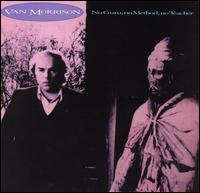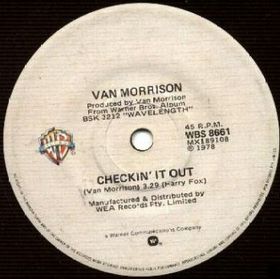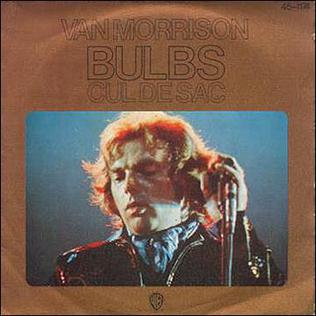Related Research Articles

Astral Weeks is the second studio album by Northern Irish singer-songwriter Van Morrison. It was recorded at Century Sound Studios in New York during September and October 1968, and released in November of the same year by Warner Bros. Records.

Veedon Fleece is the eighth studio album by Northern Irish singer-songwriter Van Morrison, released on 5 October 1974. Morrison recorded the album shortly after his divorce from wife Janet (Planet) Rigsbee. With his broken marriage in the past, Morrison visited Ireland on holiday for new inspiration, arriving on 20 October 1973. While there he wrote, in fewer than three weeks, the songs included on the album.

Saint Dominic's Preview is the sixth studio album by Northern Irish singer-songwriter Van Morrison. It was released in July 1972 by Warner Bros. Records. Rolling Stone declared it "the best-produced, most ambitious Van Morrison record yet released."

Hard Nose the Highway is the seventh studio album by Northern Irish singer-songwriter Van Morrison, released in 1973. The album contains the single "Warm Love," a fan favourite.

No Guru, No Method, No Teacher is the sixteenth studio album by Northern Irish singer-songwriter Van Morrison, released in 1986 on Mercury.
"Cyprus Avenue" is a song written by Northern Irish singer-songwriter Van Morrison and included on his 1968 album Astral Weeks. It refers to Cypress Avenue, Belfast, a residential street in Morrison's hometown of Belfast, Northern Ireland.
"And It Stoned Me" is a song by Northern Irish singer-songwriter Van Morrison. It is the opening track on his 1970 solo album, Moondance.
"Listen to the Lion" is a song written by Northern Irish singer-songwriter Van Morrison and featured on his sixth album, Saint Dominic's Preview (1972). Its poetic musings and "bass-led shuffle" lead back to Astral Weeks territory.
"Sweet Thing" is a song by Northern Irish singer-songwriter Van Morrison, released on his second studio album Astral Weeks (1968). It was on the first side of the album, that was under the heading: In the Beginning. The song was later used in 1971 as the American B-side to Morrison's single "Blue Money".

"Wavelength" is the title song from the 1978 album by Northern Irish singer-songwriter Van Morrison. Released as a single in 1978, it climbed to number forty two in the US charts, and stayed in the Hot 100 for eleven weeks. According to Howard A. Dewitt, this "was the song which re-established Morrison's hit making abilities".
"The Way Young Lovers Do" is a song by Northern Irish singer-songwriter Van Morrison from his second solo album, Astral Weeks. It was recorded in 1968, at Century Sound Studios New York City, during September and October of that year. The song is in triple metre. The distinctive feel of the original recording emerges from the non-rock style of double-bass phrasing by veteran jazzman Richard Davis and additional jazz musician session players, which combined with Morrison's soulful vocals, creates a relatively unusual combination of stylistic elements.
"Astral Weeks" is the title song and opening track on the 1968 album Astral Weeks by Northern Irish singer-songwriter Van Morrison.
"In the Garden" is a spiritually inspired song written by Northern Irish singer-songwriter Van Morrison and included on his 1986 album No Guru, No Method, No Teacher.
"Beside You" is the second track on Astral Weeks, the 1968 album by Northern Irish singer-songwriter Van Morrison and released by Warner Bros. Records.
"Slim Slow Slider" is the closing track on the 1968 album Astral Weeks by Northern Irish singer-songwriter Van Morrison.

"Bulbs" is a song written by Northern Irish singer-songwriter Van Morrison. It was the only single to be taken from his 1974 album Veedon Fleece, with a B-side of "Cul de Sac" for the US release and "Who Was That Masked Man" for the UK release.
"You Don't Pull No Punches, but You Don't Push the River" is a nine-minute song by Northern Irish singer-songwriter Van Morrison. It appears on the album Veedon Fleece, released in 1974.

"Come Running" is a song written by singer-songwriter Van Morrison and included on his 1970 album Moondance.
"I've Been Working" is a song written by Northern Irish singer-songwriter Van Morrison appearing on the album His Band and the Street Choir, released in 1970. The song was first an outtake from Morrison's well received album Astral Weeks of 1968. Other versions of "I've Been Working" were recorded for Morrison's next album Moondance, of which, three were released on the 2013 deluxe edition.
"Goin' Down Geneva" is a song written by Northern Irish singer-songwriter Van Morrison and is the opening track on his 1999 album, Back on Top.
References
- Heylin, Clinton (2003). Can You Feel the Silence? Van Morrison: A New Biography, Chicago Review Press, ISBN 1-55652-542-7
- Hinton, Brian (1997). Celtic Crossroads: The Art of Van Morrison, Sanctuary, ISBN 1-86074-169-X
- Turner, Steve (1993). Van Morrison: Too Late to Stop Now , Viking Penguin, ISBN 0-670-85147-7
- Yorke, Ritchie (1975). Into The Music, London: Charisma Books, ISBN 0-85947-013-X